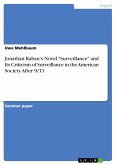Studienarbeit aus dem Jahr 2013 im Fachbereich Amerikanistik - Literatur, , Sprache: Deutsch, Abstract: America is undoubtedly one of the biggest players in international politics and foreign affairs. Its military involvement in the Fight for Freedom in Iraq and Afghanistan has cost America much international reputation though. In a poll, conducted by The BBC in 2007, America was ranked fourth in the list of the most unpopular countries in the world, with worldviews continuing to worsen. Only Israel, Iran and North Korea turned out to have an even worse reputation in the public eye. But how come? America has always pictured itself as the pioneer of freedom, the beacon of human rights and the figurehead of righteousness and humanity in the fight against al-Qaida. However, this freedom and the human rights that America proclaims to stand for have slowly been falling apart since 9/11. The image of the American dream or the city upon a hill is crumbling under the weight of America's foreign policies, post-9/11 law enforcement and public scaremongering of people perceived Arab. These circumstances raise a significant question: Where does America's fear and hatred toward Islam (Islamophobia) come from? As a matter of fact, after 9/11, America faced an increasing trend towards Islamophobia and otherization of Muslim and Arab American, which is still ongoing. Statics show that in the months following 9/11 hate crimes against Muslims and people perceived to be Arab increased to 40 times their pre-9/11 number. Public and workplace discrimination against Muslims had already quadrupled a year after 9/11. The scaremongering of Arabs as the "terrorist among us" was also greatly fueled by media representations and new laws, such as the USA PATRIOT ACT that legalized interventions with civil law of alleged Arabs and Arab-Americans and thus legitimized public racism. The fear of Islam led to discrimination, otherization a random detentions and deportations of many Arabs and Muslims. This public hysteria, fueled by propagandist media representation, increased the already pre-existing negative stereotypes of Arabs and Muslims.
Dieser Download kann aus rechtlichen Gründen nur mit Rechnungsadresse in A, B, BG, CY, CZ, D, DK, EW, E, FIN, F, GR, HR, H, IRL, I, LT, L, LR, M, NL, PL, P, R, S, SLO, SK ausgeliefert werden.









